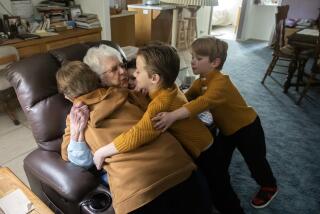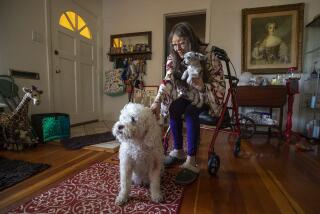How do you help a couple celebrate their 70th anniversary during coronavirus crisis? Happily and carefully
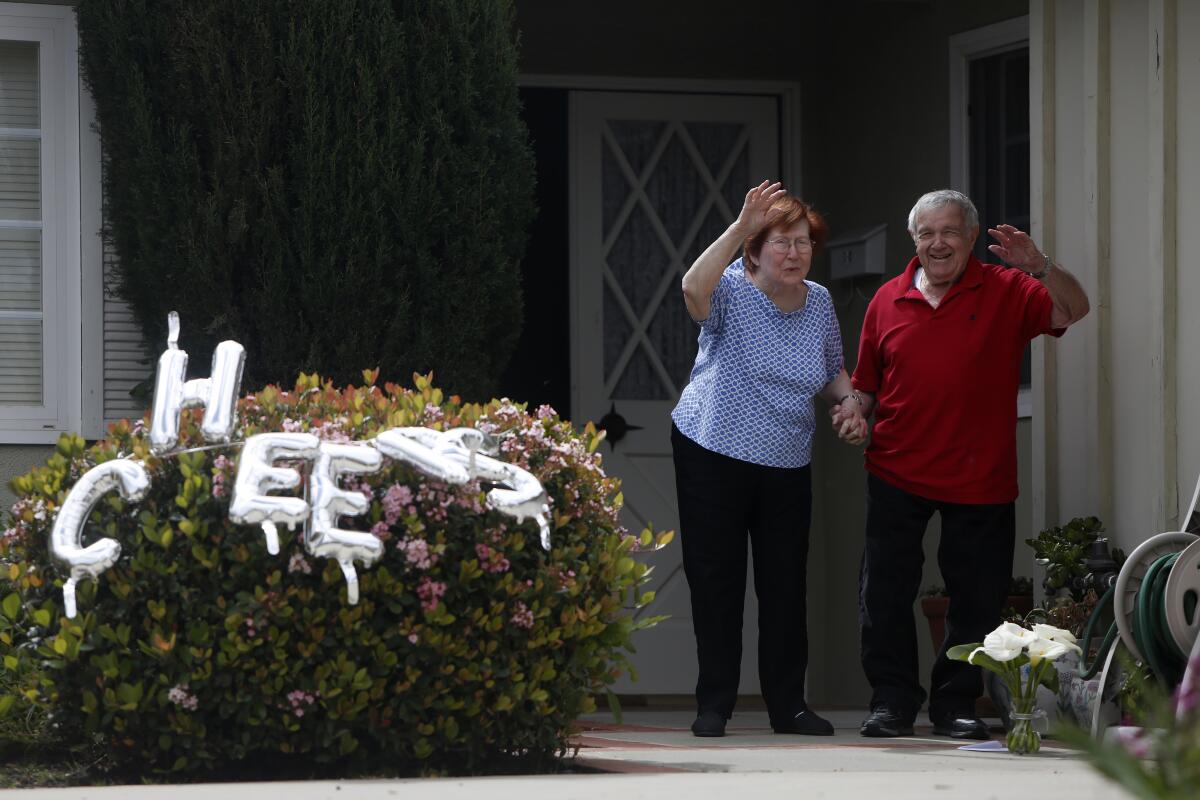
Harry Polakow was surprised when he heard a knock on his front door. He and his wife Libby are in their 90s and not supposed to have company.
But Wednesday was the couple’s 70th wedding anniversary. And their Granada Hills neighbors were not about to let the coronavirus make them celebrate the day alone.
Carrying flowers, balloons and homemade chocolate cake, they’d gathered — six feet apart, of course — on the lawn, in the driveway and on the sidewalk to toast the pair and serenade them with the “Anniversary Waltz.”
“We all love them too much to let the day go unnoticed,” next door neighbor Brad Smith later told me. He and wife Maria organized the fete and enlisted neighbors to help.
They had no trouble rallying folks to the cause. The Polakows have lived in their home since it was built in 1964, before many of their neighbors were born.
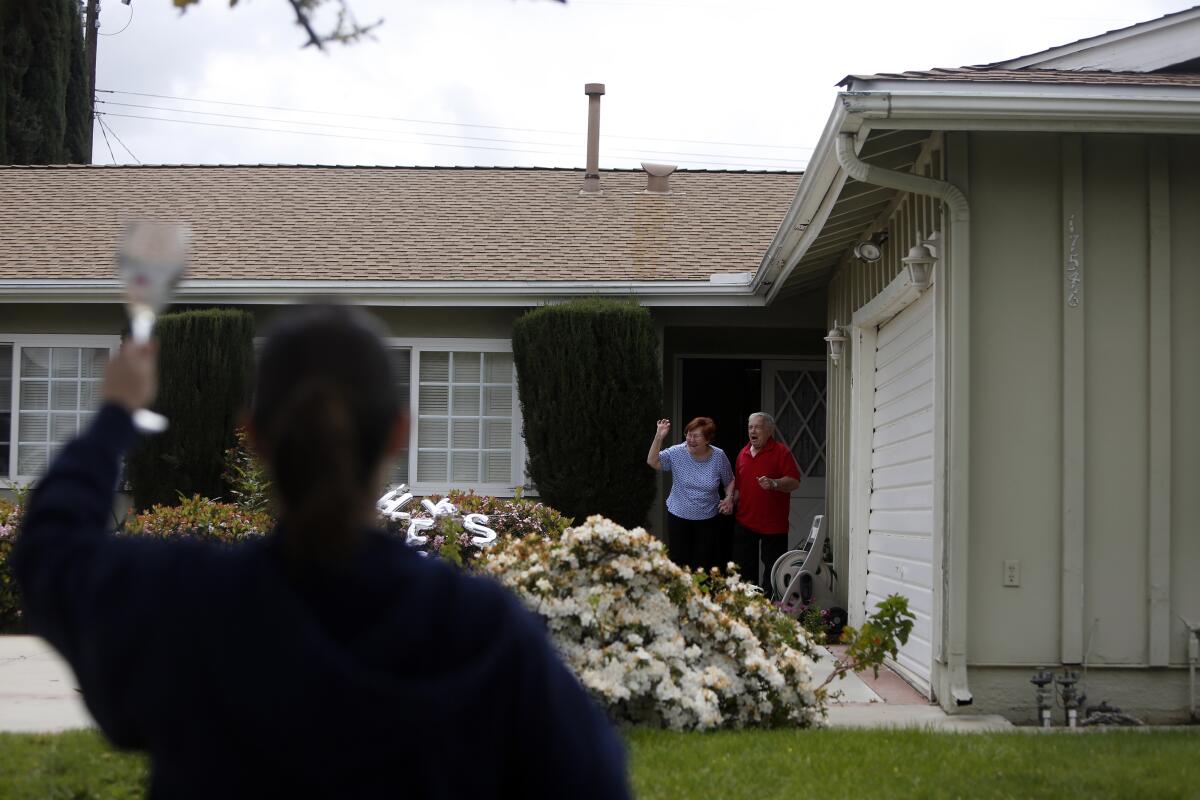
“They’re known throughout the neighborhood,” Brad Smith said. “When we say we live next door to Harry and Libby, everyone knows where that is.”
Neighbor Jean Lionelli had to rap on their window to get Harry to open the door. He broke into a smile as they made their way onto the front porch. Libby held tightly to her husband’s arm, smiling and waving like a Rose Parade queen. Harry, at 94 ever the raconteur, regaled the group with an anecdote from his wedding day.
“The rabbi gave me 50 good years, and I said ‘I’ll take that’. But somehow we got to 70,” he said, wrapping an arm around his now 90-year-old bride.
Their makeshift celebration was nothing like the country club gala the Polakows’ children had planned. But it was a reminder that neighborhood bonds can be stronger than coronavirus bans.
The coronavirus restrictions hit the couple hard. Harry’s a little hard of hearing, and Libby’s memory is getting fuzzy. Yet though most of their old friends have passed, they still had active social lives.
They did their own grocery shopping and worshiped at their temple regularly. They dressed up and enjoyed lunch dates frequently. Harry played cards with his temple buddies three days a week. They spent time with their children and looked forward to their granddaughter’s visits; now she can only drop off food and leave.
“The last two weeks, I haven’t been allowed to go out of the house at all,” Harry told me in our phone interview. But there was no hint of complaint in his voice.
“We’re blessed,” he said. “We’ve got a lot of family and friends to take care of us.”
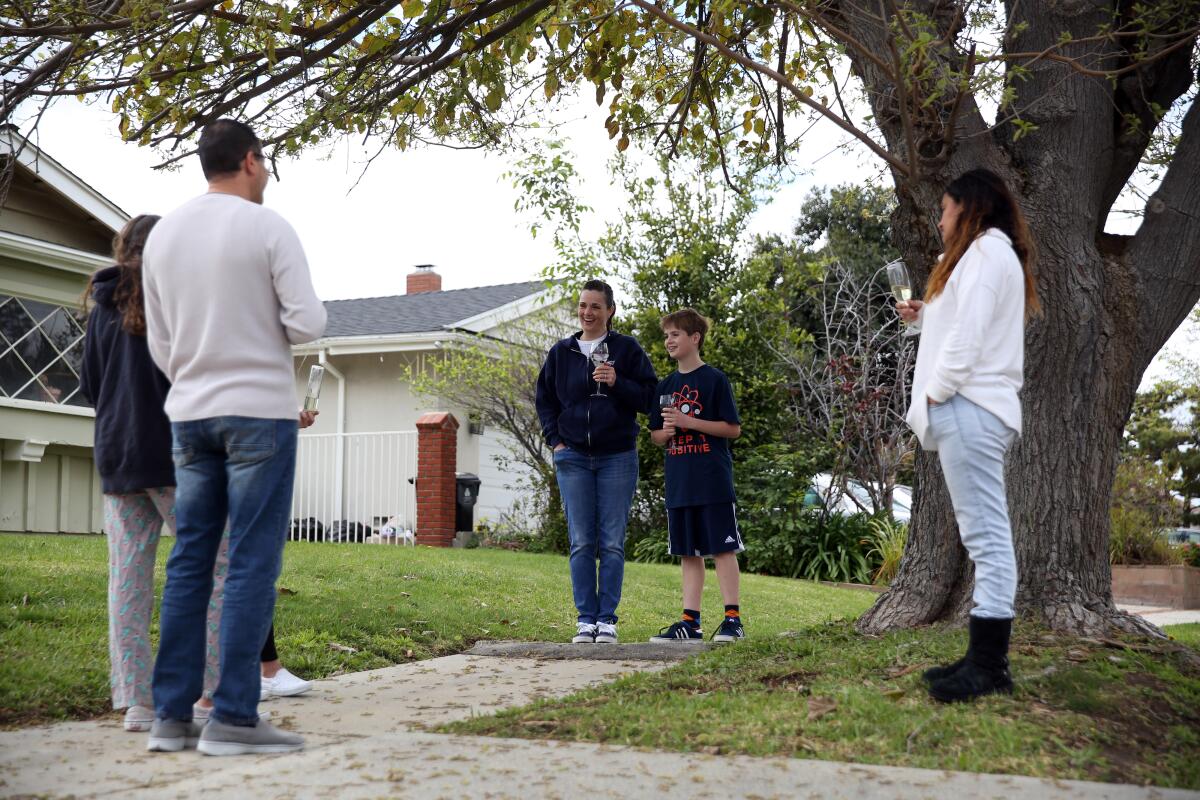
The caretaking goes both ways, their neighbors say. In their younger days, the Polakows helped neighbors plant gardens, guided home repairs and hosted gatherings, with Harry’s sister, who lived across the street.
They always sprang for Girl Scout cookies, gave out king-sized candy bars every Halloween, and patronized the kids’ sidewalk lemonade stands. And no matter how sour or seedy the drink, they always pronounced it deliciously refreshing.
“They’re the glue that holds the neighborhood together,” said Heather Cowie Eaton, who lives across the street and brought her 12-year old son Jameson. “They’re like honorary grandparents to all the kids on the block.”
Roushdy Shenouda nodded vigorously. He’s a professional chef, and baked the party cake — which Harry and Libby took inside to devour. “You couldn’t ask for better neighbors,” he said. Their mere presence gives the block a feeling of stability.
The little street gathering didn’t last long. Within 20 minutes, everyone was back inside their individual homes. But the feeling of friendliness lingered for me. I found myself waving at strangers as I drove down the street.
I thought about how I often judge my neighborhood from the tenor of our Nextdoor feed, which focuses on our needs, our fears, our disagreements. And how much better I might feel, in this time of sacrifice and peril, if I thought more about my in-real-life encounters with actual people who live nearby and actually care about me.
For months, Harry and Libby had been looking forward to their anniversary gathering.
“My daughter belongs to a country club, and she had things all planned out said,” Harry told me. A nephew was coming from Cleveland; another nephew and niece were flying out from Chicago. Then the virus shuttered the club, grounded flights and forced the couple to stay inside and self-isolate.
They’re not spending much time worrying about how vulnerable they might be. But they are taking shelter-in-place very seriously. Harry, particularly, misses being around people. His career was in the grocery business, and he enjoyed the socializing.
“But people have to sacrifice,” he said. “You do what you can do.”
He’s a World War II vet who fell in love with Libby in 1946, right after he was discharged and moved home to Chicago.
“I went down to the beach and met this lovely 18-year-old,” he said. “She had a blanket and it had room, so I went over and sat down and talked with her.”
He impressed Libby by borrowing a friend’s 1947 Plymouth and letting her believe he owned it. Then he spent $60 — almost an entire month’s veteran stipend — on dinner at Chicago’s legendary Palmer House. When he proposed, how could she possibly say no?
Libby may have thought she was marrying a high roller. Instead she has spent the last 46 years rooted to a modest tract home in a sleepy suburb that calls itself the San Fernando Valley’s “most neighborly town.”
And she’s content with that — even when it’s on lockdown.
More to Read
Sign up for Essential California
The most important California stories and recommendations in your inbox every morning.
You may occasionally receive promotional content from the Los Angeles Times.

